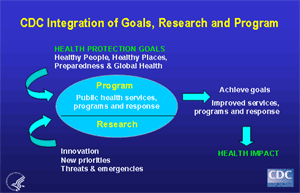About OPHR - Program Overview
Overview of Public Health Research at CDC
 |
|
| Robert F. Spengler, ScD, Director, OPHR | |
OPHR Mission
As part of the Office of Chief Science Officer, OPHR provides leadership,
vision, and coordination for the CDC research program, both for research
conducted within CDC (intramural) and for research conducted by external
grantees and partners (extramural). OPHR achieves its mission through several
core functions:
- Developing and maintaining a CDC Health Protection Research Guide, 2006-2015 and enhancing and leveraging resources for research;
- Evaluating and monitoring CDC’s overall research portfolio progress in meeting the CDC research agenda and health impact goals;
- Enhancing CDC extramural research by developing, supporting and training in standardized best practices across CDC for the grant life-cycle; and
- Developing and supporting new research initiatives and peer review and grants management activities for cross-cutting research and public health priorities.
Research Support and Peer Review
CDC uses grants and cooperative agreements
mechanisms to support extramural research
projects. All extramural research applications
to CDC are peer reviewed. Under the peer review
process, applications undergo two levels of
review. The initial merit review is conducted by
a panel of external experts and overseen by a
Scientific Review Administrator. The purpose of
the secondary review is to consider programmatic
and policy priorities in addition to the merit
evaluations and rankings from the primary
review. The secondary review is performed either
by senior federal officials or an advisory
committee whose members are external to CDC. For
more detail see the CDC peer review policy.
Grants and cooperative agreements are administered by scientific staff known as Program Administrators. In addition to the administration of research projects, Program Administrators interact with scientific investigators, assist with program planning and development, evaluate grantees’ scientific progress, and identify opportunities for future research.
Given the breadth and magnitude of the CDC mission, it is crucial that the most promising and high-quality research projects are selected and supported. OPHR provides a central focus for policy development, guidance, support and training in best practices for peer review and extramural research across CDC.
The Future of Public Health Research
We hope this website offers CDC scientists, staff, and the external research
community with a valuable source of information on public health research at
CDC. We have provided links to CDC websites, Department of Health and Human
Services policies and guidelines, and NIH websites and documents where
appropriate and necessary.
Research conducted and supported by CDC remains closely integrated with public health services, programs, and responses (see figure). Research improves CDC and partner services that result in greater health impact. Through OPHR’s leadership and CDC’s continued investments, public health research will provide new understanding, new tools, new evidence-based interventions, and effective dissemination strategies that result in real and important impacts on the health of individuals and communities.
Thank You – Robert Spengler
Page last modified: October 6, 2006
Content source: Office of the Chief Science Officer (OCSO)

